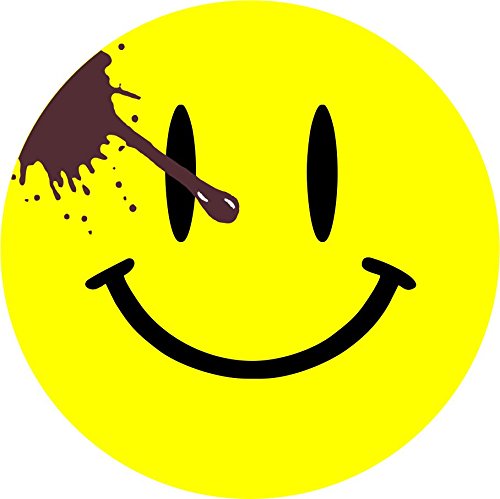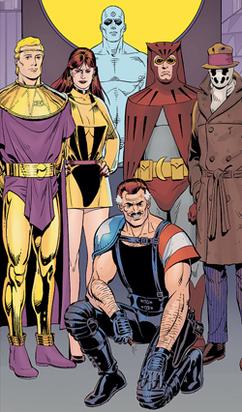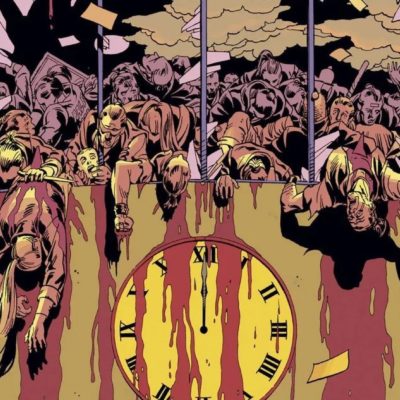 Yes, this is yet another WATCHMEN article. The internet has long since been saturated with reviews, analyses and what-not of the WATCHMEN graphic novel and movie adaptation, including a piece by yours-truly. The fact is, however, that I’ve got more to say on the subject. I’ll take this opportunity to post a SPOILER ALERT for those unfamiliar with either incarnation, as I’m going to be discussing the ending of the novel in some depth.
Yes, this is yet another WATCHMEN article. The internet has long since been saturated with reviews, analyses and what-not of the WATCHMEN graphic novel and movie adaptation, including a piece by yours-truly. The fact is, however, that I’ve got more to say on the subject. I’ll take this opportunity to post a SPOILER ALERT for those unfamiliar with either incarnation, as I’m going to be discussing the ending of the novel in some depth.
As promised in my previous commentary, I saw the WATCHMEN movie a second time. Having already catalogued my initial reactions pretty thoroughly, here’s how I felt during that subsequent viewing:
The film is still powerful and ambitious in a way few others can claim. Will it stand up like the comic has? I’d venture not (see below).
- Zack Snyder has a real talent for erasing any and all sociopolitical content from his films—think back to his ‘04 DAWN OF THE DEAD remake, which nixed the original DAWN’S pointed critique of mindless consumerism, and so, according to George Romero, “lost itshttps reason for being.” I don’t feel the WATCHMEN movie entirely lost its reason for being, but Alan Moore’s stabs at media manipulation and the fallacy of superhero worship, which were crucial to the novel’s conception and impact, have been largely jettisoned.
- The “acting” of Malin Akerman as Laurie is a serious drawback (was she really the best actress available?), and her oft-repeated refrain of “You’re such as asshole!” was hardly the stuff of which great catch-phrases are made.
- I find myself wondering what somebody who isn’t familiar with the comic might make of this film, with its constant viewpoint shifts and riot of flashbacks (an online post headlined “Just Saw it—Didn’t understand any of it” would appear to offer some clue).
- I still think Snyder’s use of music, which has proven extremely controversial on the fanboy circuit, is spot-on (the silly “Ride of the Valkyries” ‘Nam montage excepted). I even liked the use of Leonard Cohen’s “Hallelujah” during the airborne sex scene; I know the tune has been overused in movie and TV soundtracks over the years, but there’s a reason it’s become so iconic.
- Goddammit, I’m still sore about the loss of the squid!
That’s essentially how I feel about WATCHMEN the movie. I see it “only” made around $55 million during its opening weekend at the box office, far less than was forecast. If you’ve been holding off seeing WATCHMEN, I’d suggest doing so ASAP. Admonitions aside, it really is one of the most unique and exciting films on the market, and one you should really experience on a big screen.
Now let’s take a(nother) look at the graphic novel version. Having read it umpteen times in the years since its mid-eighties inception, I’d say my  feelings are set: I think it’s a timeless masterwork that remains among the pinnacles of comic book scripting and illustration. An interesting aspect of the hype surrounding the film version is the assortment of opinions, pro and con, proliferating about this 23-year-old masterwork.
feelings are set: I think it’s a timeless masterwork that remains among the pinnacles of comic book scripting and illustration. An interesting aspect of the hype surrounding the film version is the assortment of opinions, pro and con, proliferating about this 23-year-old masterwork.
Most of the opinions, of course, have been laudatory. There are evidently quite a few people like me who’ve lived with the comic for years and now treat it like a beloved family member. Not all, though.
According to one online screed, “Moore hates heroes…He hates the heroes who gave up on heroism (Nite Owls 1 & 2), painting them as impotent losers. He hates the heroes who kept fighting (The Comedian, Rorschach), making them into psychopaths and worse. But most of all, he hates the superhero (Dr. Manhattan), who he insists must be a vaguely-doltish uber-mensch. And more than anything else, in Moore’s mind, heroes mean fascism.”
I chose to single out that particular quote because it inadvertently encapsulates a lot of what I feel makes WATCHMEN such a revelatory piece of work. The criticism is partially correct: WATCHMEN’S protagonists do indeed exhibit traces of doltishness, psychopathy, fascism and worse. The novel is, in fact, a subversive deconstruction of traditional superhero ethos, and something of a poisoned valentine to fans of such fare (note a supporting character’s lament about “Everybody escapin’ into comic books”). But to say Moore “hates” his heroes (or his readers) is wrong.
To whit, Rorschach may be a shady, near-psychotic vigilante, but it’s his obsessive persistence that leads to the solving of the mystery at the tale’s core. Nite Owl 2 may be a bit of a wuss, but proves more than once that he’s quite capable of rising to the occasion (pun intended!). Dr. Manhattan a “doltish uber-mensch?” Maybe, but he performs quite a few noble deeds; doltish or not, he never acts out of evil, only trying to help those he (rightly) perceives as his inferiors.
 That leaves us with Ozymandias and The Comedian, the most questionable figures of WATCHMEN’S stable. The former, the apparent Smartest Man in the World, is a sociopathic a-hole who callously doles out murder to further his oft-twisted ends. His amorality reaches its apex in the final chapters, when he unleashes a horror upon New York City that kills thousands. And yet his aim is a noble one: he wants to end war—and, furthermore, he actually succeeds in doing so.
That leaves us with Ozymandias and The Comedian, the most questionable figures of WATCHMEN’S stable. The former, the apparent Smartest Man in the World, is a sociopathic a-hole who callously doles out murder to further his oft-twisted ends. His amorality reaches its apex in the final chapters, when he unleashes a horror upon New York City that kills thousands. And yet his aim is a noble one: he wants to end war—and, furthermore, he actually succeeds in doing so.
As for the Comedian, there aren’t too many good things I can say about this self-hating, baby killing rapist—other than the fact that Sally Jupiter, the target of much of his abuse, secretly loves him, as slyly revealed in one of the comic’s final panels (an image conspicuously absent from the film). This doesn’t necessarily mean he’s secretly a good guy or Sally a masochist, just that their relationship is far more complex than it might seem.
Such complexity, I feel, is what truly elevates Alan Moore and Dave Gibbons’s work. Making a “bad” guy sympathetic is difficult enough, but to create a tale as complicated and apparently contradictory as WATCHMEN while still delivering a streamlined and exciting superhero saga is unheard of. The movie version, cool though it is, fails to replicate that feat. This is a prime reason I believe its stature is sure to decline in the years to come, while the comic will remain on top.
